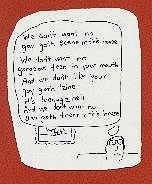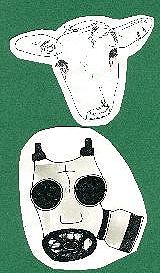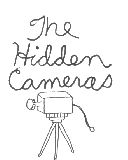
GAY MARRIAGE?
Are you mad?
Bodies unbound
The Hidden Cameras:
Communal cacophony, liberated
energy, a wall of sound -- & the walls
come tumbling down
"Ban Marriage!"
"We aren't fools to fall in love, but let 'coupledom' die"

I was late getting to church on the morning of my ceremony
Ban marriage, Ban marriage (Ban it all!), Ban marriage (Ban it all!)
Stayed up too late the night before from fingering foreign dirty holes in the dark
The morning sun blinded my eyes and made my skin loom pale and taint in the light
And there were steps to climb as I unloosened my tie
As I began to walk the aisle the congregation looked behind
But I continued past the pews and met my angel with a smile
And as I looked him in the eye I heard my best friend cry
That we "aren't fools to fall in love but let 'coupledom' die"

The minister was drunk and high from his rewrite of holy verse with more lies
Ban marriage, Ban marriage, Ban marriage (Ban it all!), Ban marriage (Ban it all!)
But the organist she played with a tenacity and grace that was fine
The whole room was filled with the thunder and flood
Of just one chord; the thrill and clarity of sound
But soon the song went slowly dead and I was force to take a stand on one side:
It was him or my fag hag, oh well, I guess she was never that good of a friend
After my fag hag friend had fled the minister looked mightily fed and content
We said his rewritten vows that I could hardly pronounce
but was soon drowned out by that organ and the shout of

The congregation, stunned and dumbed, looked upon me with an inodorous stare
Ban marriage, Ban marriage, Ban marriage (Ban it all!), Ban marriage (Ban it all!) Ban marriage (Ban it all!) Ban marriage (Ban it all!) Ban marriage (Ban it all!) Ban marriage (Ban it all!) Ban marriage (Ban it all!)
I wept, and on my knees I prayed that there be truth and there be light in my day
In my hung-over daze I felt the thunder of God
It was the orders that I take the wrath upon my own rod
Then I repeated my own vows, they were perverted and they smelled of myself
"That there is splendor in the harshness of bum
that consummation makes a grumble and the sound that I have learned called:
Saturday night, and I'm goin' to the chapel. A grand one, cradled beneath the turrets of a red sandstone behemoth, the University of Toronto's Victoria College. My invitation reads: "The Hidden Camera's play The 'Let Coupledom Die' Show,'" October 12, 2002.
I'd got it the week before at a gallery on Queen West, there for works by Paul P, a painter lately met. It was hand-delivered, by a tall young man I hadn't yet met. And hand-made: on the back was a matrimonial couple circled and slashed in red. He had three versions: husband & wife; husband & husband; wife & wife.
I'd just spent the day doing a few hand-made bits of my own (as can you see in "Don't groan -- organize!"), happy to find a kindred spirit, rare on this front. Or maybe not so rare. Maybe I just didn't know where to find them.
So: off to Vic, built by Methodists in 1892. Its chapel, true to its roots, seems more an auditorium: not an altar but a stage; not pews but row seats -- if vast, high, and with a huge pipe organ. We were here, after all, for "the tones and groans of gay folk church music." Whatever that might turn out to be.
At first it was just four guys, a guitar, a cello, and (I think) a violin, the songs calm, mellow, well... folk. More or less. The audience was young if sedate; a few people sat, even sprawled, on the stage steps. I might have been at an anti-war rally at Boston's Arlington Street Church in 1969.
A choir joined them: maybe a dozen, men and women and not in robes, getting a bit more rousing. The lead singer took to a drum set -- bam! bam! bam! bam! -- and then the power went out. Then it came back on. And more people came on stage: on kazoo, tambourine, accordion, xylophone, keyboard, horns, harp; on instruments I'd never seen before. And on the organ -- roaring "thunder and flood."
There were two dancers, boy and girl, both done up as cheerleaders, heads masked by white balaclavas; another in tiny briefs, flowing chiffon and a huge feather headdress. The cheerleaders tossed pom-poms, dripped menstrual "blood" -- and stripped down to football shoulder pads. I was taken back to the Rocky Horror Show, 1975.
They weren't the only dancers: everyone on stage danced, jumped, yelled, bellowed song. And swapped instruments. One mad drummer climbed under the keyboard set, snatched its foot pad up against his thighs and played its pedals by hand. People near the front got up to dance, one boy leaning into a mic to sing. It got hard to tell who was the band, who maybe their friends, who the spectators (if none merely).
There were soon no bums in those seats; the whole room was on its feet, dancing. It felt to me then maybe 1989: bringing down the Berlin Wall.
Well: talk about hyperbole. My historical allusions that night were forced, even media-facile: anything fresh must be "like" something we already know, must fit some frame -- or we just won't get it. This night was none of those past events. It was its own moment. Now. But its power did recall those moments past. Not just their energy, but something more subtle.
Watching all those people, 26 by the end, nearly all playing everything (most, I'd later see, also played roadie) -- all that cacophony making something coherent, powerful, joyous -- I also recalled other moments. Many moments, over more than a decade, at The Body Politic. Our medium wasn't music; we weren't often raucous (except when we had to be) -- but we had worked in the same spirit.
I knew I hadn't seen just another band -- but a rare vision of how people can come together to make something of their own. I sensed it had not been an accident; I hoped it was a conscious vision. I wanted to find out. So I asked a guy for a date.
Joel Gibb, invitation-maker and apparent lead guy, later met me over coffee. That vision, I learned, was conscious. And his. If not his alone. Born 25 years ago in suburban Mississauga, a student of art history, religion, anthropology, his U of T degree in semiotics (symbols, signals, noise: that Vic gig was "an official semiotics event"), Joel had long written and recorded his own songs.
At home, on a four-track. Played for his friends. Among them was painter Paul P, then running a gallery. He asked Joel to play at an opening. Bandless, Joel called on other friends: that gallery gig was a quartet. And a hit. And soon growing: within a year The Hidden Cameras had gone, as a January 2002 story in NOW put it, "from a quaint home studio project to a full-fledged pop army."

|
So who's hiding?
"The Hidden Cameras," Joel told me, is a nod to philosopher Michel Foucault's critique of public surveillance: the secret, all-seeing eye of the "panopticon" -- born in prisons.
|
An army of lovers? Well, friends anyway. Lots of them, a shifting crew -- surely lovers of what they do. (One of their songs: "Music is My Boyfriend.") That, after all, is what "amateur" means: doing it for love. Some are trained musicians, even pros: Bob Wiseman, former keyboardist for Blue Rodeo, has shown up on organ.
But, as Joel says, "the music's not complicated, it's so rooted in three-chord songs" -- citing among his influences the (lately bound) pop guru Phil Spector and his "wall of sound." Some instruments, percussion in particular, "are very easy to play."
And not everyone has to play instruments. They can play their bodies. Music reviewers rarely fail to note, as one put it in the Star, "masked, semi-clad go-go dancers, most of them male, cavorting about the stage and on platforms high above, waving their bare bums at every opportunity, even slam-dancing on the floor at one point, spreading sweat and jubilation everywhere."
Almost literally everywhere. Local bands usually play the "indie" bar scene. The Cameras have, if not always happily. "Indie shows," Joel has said, "in my mind are associated with people not moving, smoking cigarettes, maybe making little insults to their friends about people who are trying to dance. There are so many asexual indie boys it's not even funny. It's a pretty repressed culture. They don't dance at shows, and they don't really express themselves. They're blinded by cynicism."
The gang played less obvious venues: galleries, churches, a porn theatre, a Jewish old folks' home. Often with a theme, reflected in those hand-made invitations, hand-made props, sets, and costumes (they're artists, mostly visual; artists make things): "The Disease Show" (with British video: mad cows); "The Skull Show" (papier-mâché ones hung "like a floating dead audience"); "The Bread and Shit Show" (at that XXX theatre); "Breathe On It" (if you can; with gas mask).


|
|
We don't want no gay goth scene in this house
We don't want no
And we don't like your
And we don't want no
|

|

"Gay imagery is so blatant in the church. Everywhere you look there's a phallus." |
"The Holy Trinity of the Hidden Cameras Show" at the Church of the Redeemer (they would play Holy Trinity too) featured a cross -- morphed into a dick- headed dagger. Blasphemy? Don't bet on it: Joel grew up Baptist, in a "strongly church- going family." He hasn't rejected religion; he has reshaped it.
"I'm trying to reclaim homoeroticism in the church. Gay imagery is so blatant in the church.... Everywhere you look there's a phallus." Rock and roll, he reminds us, was born of gospel music. "In a lot of my lyrics, it's hard to distinguish whether I'm talking about god or talking about a boy."
Church fathers at Redeemer seemed not to mind Joel's theology. Or dancers crowd- surfing the pews. Even dead-cool Goths in the vampire pit of Queen West's Vatikan gave in: faced with The Camera's wild romp, one critic wrote, "anything your own cynical ass does can't possibly look silly." Even bouncing to gay folk church music. "It's celebratory," says Joel. "It's joyous music. It's not just gay, it's gay."
In the mainstream sense of "gay," in fact, The Hidden Cameras are not "just gay" at all. The band is a fluid mix of genders and sexualities -- "queer" in a way long more celebrated on Queen Street West than at Church and Wellesley.
Their ease with ambiguities unsettles the fixed "LGBT" frame; their joy doesn't appeal to the stylishly jaded; their probing lyrics and eclectic tunes can be a bit much for a "culture" mired in facile clichés. "If you flip through gay magazines," Joel says, "it's all about hair removal and tanning and going to the gym, and that's exactly what's wrong with our culture."
They did do a gig at Pride 2002: "The Blindfold Show," 30 players on stage, some blinded. One dancer stripped naked -- instantly set upon by Pride's nudity-nervous security pups, and real cops, insisting he get decent. He did. If not for long. The Star told the story in an otherwise decent piece: "Exposure Grows for Hidden Cameras."
| Blindfolded: | Smells Like Happiness | |

|
Happy we are when we choose to wear our homemade blindfolds
And mark our own day with a parade and a song... In our minds our fathers have died and we realize that cities have clubs and we like to get drunk and high from the smells we inhale from dirty wells and the mouth of a boy who smokes cigarettes...
Happiness has a smell I inhale like a drug done in a darkened hall or a bathroom stall with a friend or a man with a hard-on
As well, it is the smell of old cum, on the rug, men walk their dirty feet on and the sweat from the chest of a man in a leather uniform Happy are we when we choose to wear the blindfold and mark our own place with the smell of our own |
This crazed "gay folk church" choir does have one true church: The body. "It all comes down," Joel Gibb has said, "to the body." That might be said about "gay culture" too, famously fixated on bodies.
As commodities. Currency whose value we must ever beef up to meet the demands of the gay marketplace. Actual, fallible bodies we must "get in shape" as "The Perfect Body" -- in gym-bunny obsession brilliantly explored by Brian Pronger in his 2002 book Body Fascism: Salvation in the Technology of Physical Fitness.
Behind that frantic search for physical perfection, Brian says, is a profound alienation from our bodies; from their rich, truly human and deeply spiritual possibilities. "We're afraid of our bodies," Joel once said, "in huge, huge ways that we can't even admit to." The Hidden Cameras offer salvation by a different route: not anxious fixation but wild celebration of what our bodies, unfettered, can do.
In their shows you don't get many "perfect" bodies (if not a few truly delicious). You don't see moves tight as a military drill, everyone precisely in synch. (Or N'sync.) You're amidst varied bodies inescapably real, intensely physical -- singing, dancing, strumming, banging, yelling, sweating, flying all over the place. Bodies unbound, glowing with the power of what they, together, are making before your eyes.
It is an experience wildly, and deeply, erotic: a living display of what poet Audre Lorde called "the erotics of power" -- "the open and fearless underlining of my capacity for joy." She felt it "dancing, building a bookcase, writing a poem, examining an idea." Erotic knowledge empowers us. "This is one reason why," she wrote, "the erotic is so feared."
-
"...that deep and irreplaceable knowledge of my capacity for joy comes to demand from all of my life that it be lived within the knowledge that such satisfaction is possible, and does not have to be called marriage, or god, or an afterlife.
"And this is a grave responsibility, projected from within each of us, not to settle for the convenient, the shoddy, the conventionally expected, nor the merely safe."
"My fantasy," Joel Gibb once said, "is that two strangers meet at our show and become friends, or organize something, or just hook up and have sex, any kind of connection. Our culture has turned us into robots who don't know how to think or feel and our society tries to prevent community action, so this is our community."
Yes. But I wouldn't call that a fantasy. I've seen it happen. More than once.

Go on to:
Shame on you!
Claiming we're not all "just like everybody else"
could get you branded a traitor
Or go back to:
This page: http://www.rbebout.com/getfree/cameras.htm
Rebels with a cause -- & a cause without rebels
(Culture Wars: Contents page)
Ideas in play
(Main contents page)
Gay marriage? Wrong question (Lead page)
My home page
December 2002 / Last revised: May 1, 2003
Rick Bébout © 2002 / 2003 / rick@rbebout.com